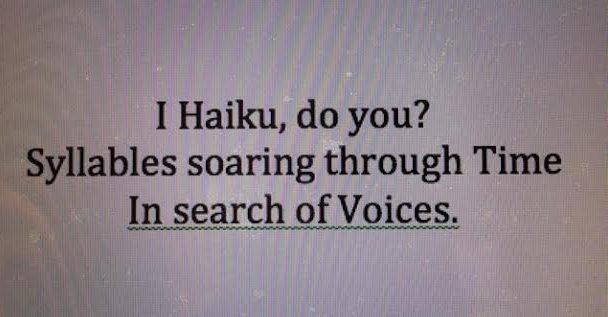I Haiku, Do You? ~ 31 Haiku in Search of a Voice ~
Last week, I wrote a post about writing 31 Haiku in March 2016, one for each day of this month. I’m not a poet, but I love poetry. But maybe, just maybe, we are all walking around this world of ours with the Voices of Poetry, Poetry Searching for our Voices.
I’m calling this writing project ~ I Haiku, Do You? ~
31 Haiku in Search of a Voice…
I will wait ’til each day’s clock turns to midnight, or each morning awakens, or each noon becomes high, or each afternoon rests into evening, even if it takes ’til 11:59 pm for that precise, perfect moment of inspiration to write my Haiku for that one day. I will try to accompany my Haiku with a photograph of each day’s moment of poetry, moment of Voice.
I’m doing this writing project for my 11, soon-to-be-12 grandkids, and for the great gift of capturing moments for them. This will be my gift to them. I hope they will see and hear and feel and taste and smell these 31 Haiku, as the Haiku acquire Voices.
If you’d like to follow along with 31 of your own Haiku, or any number of Haiku during March, that would be wonderful. If you’d like to get your kids or students or grandkids to try their Voices at Haiku, this would be wonderful, too. Sharing poems is sharing the universe. I’ll be using the hashtag #GoPo (#GoPoetry).
And speaking of verse, I will be following the traditional Haiku style, as outlined here very nicely at Your Dictionary:
Haiku Structure
There are no specific rules for writing haiku; however, the structure of haiku is always the same, including the following features:
- Only three lines, totaling 17 syllables throughout
- The first line is only 5 syllables
- The second line is 7 syllables
- The third line is 5 syllables like the first
- Punctuation and capitalization rules are up to the poet, and need not follow rigid rules used in structuring sentences
- Haiku does not have to rhyme, in fact many times it does not rhyme at all
- Some haiku can include the repetition of words or sounds
Defining Haiku Poetry
Haiku is a descriptive form of poetry.
Originating in Japan, haiku poetry typically discusses subjects from the natural world, including seasons, months, animals, insects, and even the smallest elements of nature, down to a blade of grass or a drop of dew.
While haiku does not have to only cover natural subject matter, it is most often used as a celebration of nature.
****************************************************************************************
I Haiku, do you?
Syllables soaring through Time
In search of Voices.
Find those Moments.
Capture those Syllables.
Give those syllables a Voice.
Become a Poet.




